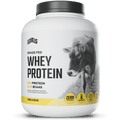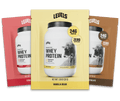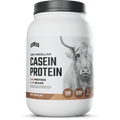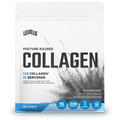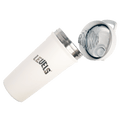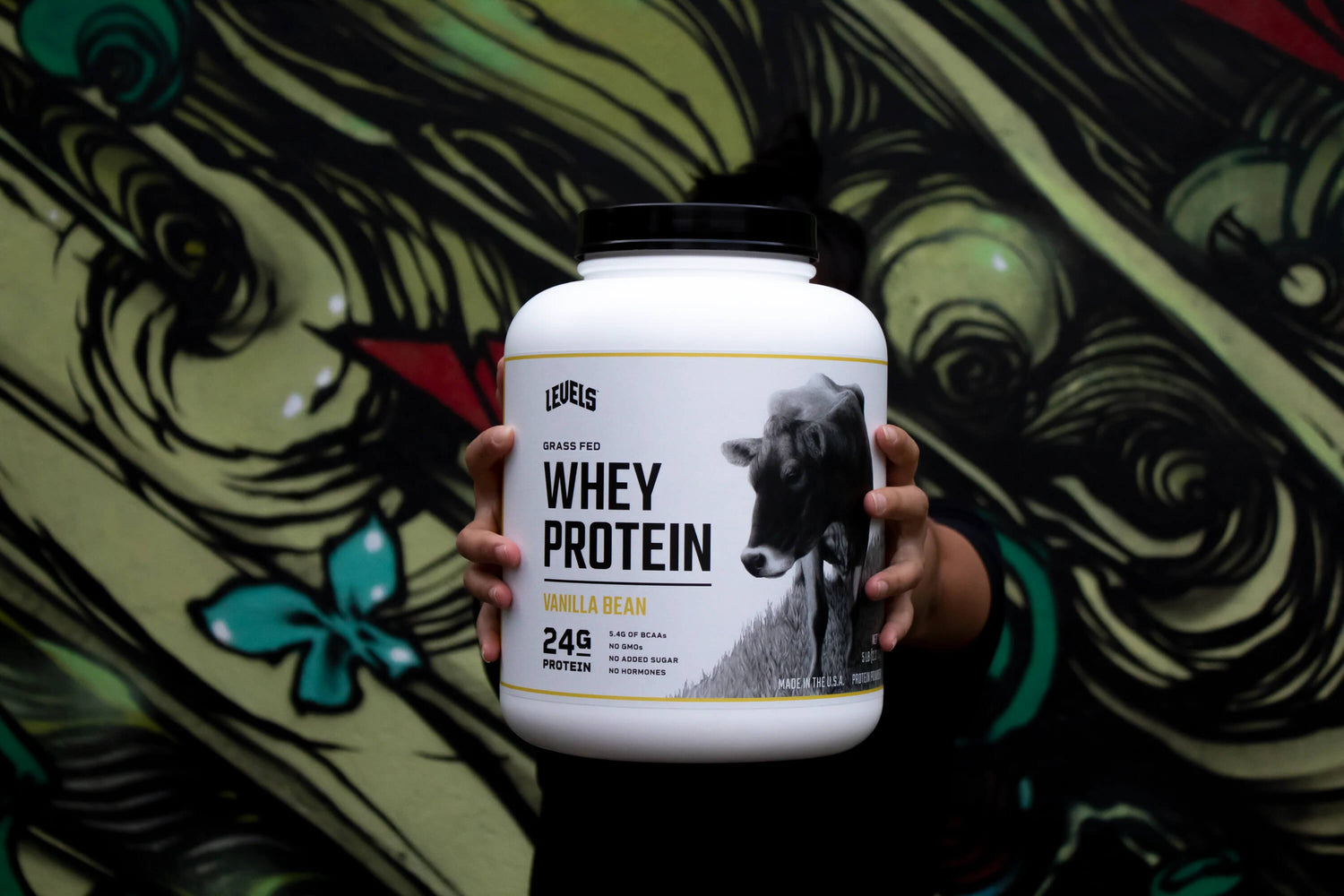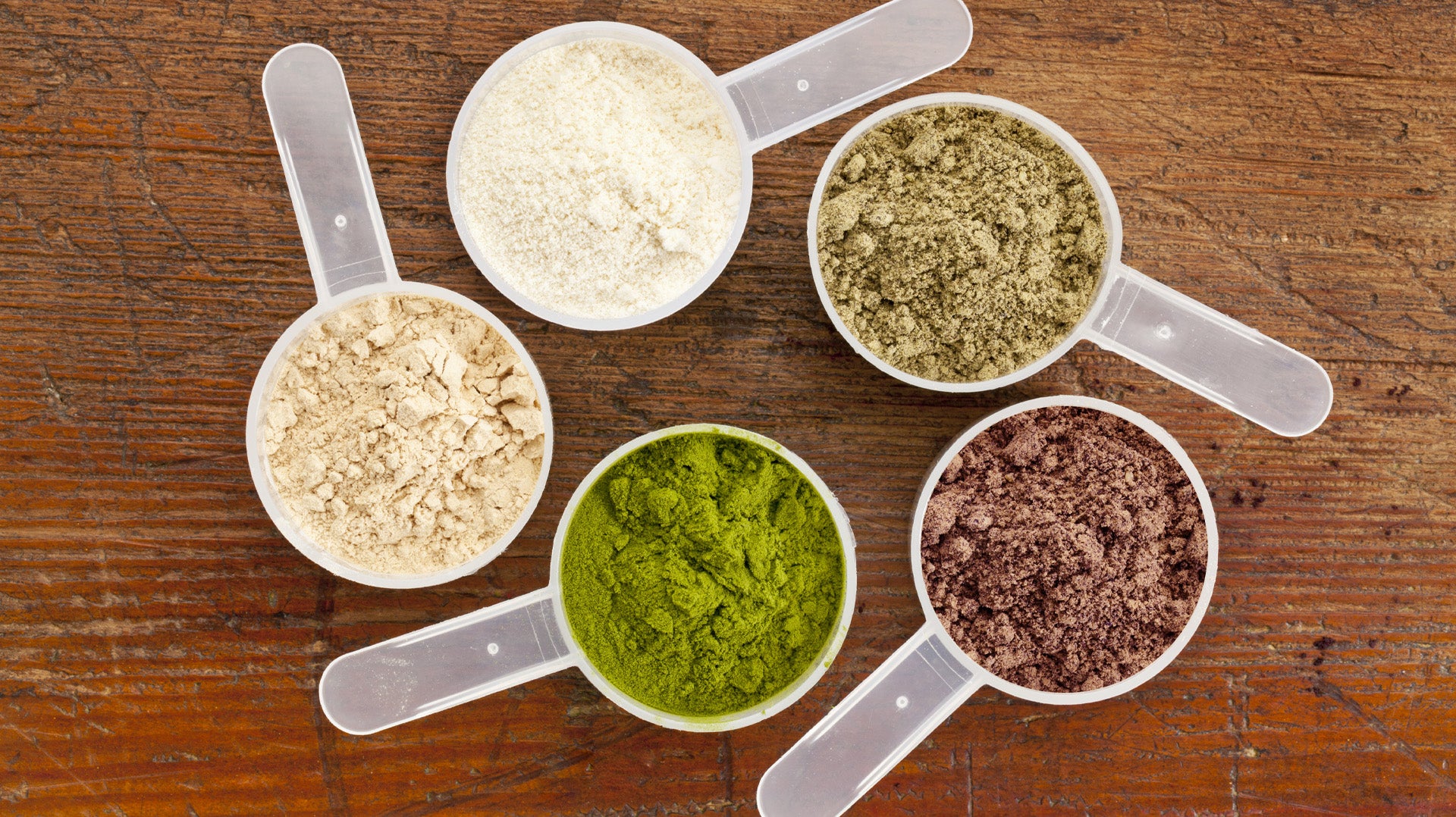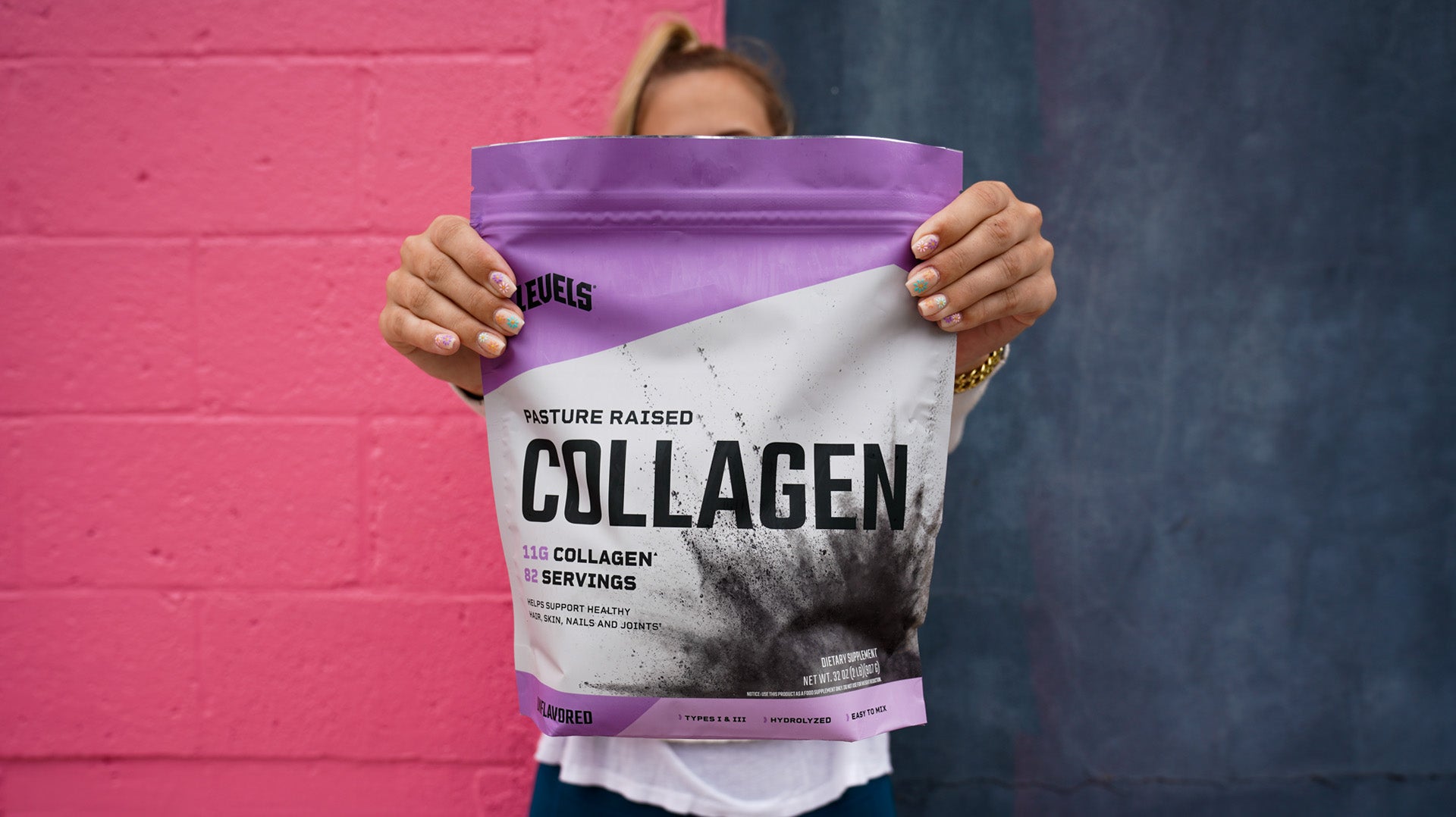What if you could burn fat, build lean muscle, and reach all your goals simply by taking the right supplements?
If that sounds remotely possible, you’re probably paying way too much attention to fitness industry marketing.
However, if you consistently follow a reasonable nutrition plan and a solid training program, the right supplements can make a huge difference in your results.
Research shows that when included in a training regimen, whey protein may boost muscle-building by 9 pounds as well as help reduce body fat by 3 pounds over 10 weeks compared to other types of protein[*].
Or take creatine for example, which according to scientific research can increase lean muscle mass by 2-4 pounds over 4-12 weeks of training, as well as prevent the loss of muscle mass during fat loss[*].
Keep reading to learn more about whey protein, creatine, and 8 more supplements proven to help you lose weight and build muscle.
All of the supplements in this article are:
- safe for both men and women according to medical studies,
- not only safe, but also great for your health, and are
- shown by peer-reviewed evidence to lead directly to faster weight loss, increased muscle gain, or both, or
- support healthier hormones, higher strength levels, or other factors that can improve your results.
Here are the top 10 supplements for weight loss and muscle gain, where they should fit into your diet and exercise regimen, and exactly how you can use them to reach your goals.
1. Whey Protein
Whey protein is a fast-acting, easy-to-digest protein that’s high in essential amino acids, placing it among the highest quality protein sources in the world[*].

Along with being a convenient supplement to help meet your daily protein requirements, scientific studies suggest that whey protein also has several unique benefits for active people.
The Evidence for Whey Protein
As with any protein supplement, whey protein works in part by contributing to an adequate daily protein intake.
When you consume at least 25-30% of your daily calories from high-quality protein sources, your body burns more fat, builds more muscle, and recovers faster from training[*].
According to a 2019 study, consuming 40 grams of whey protein during resistance training can increase muscle-building, even when the group receiving whey protein consumed less overall daily protein compared to the placebo group[*].
A separate, double-blind trial in which recreational bodybuilders received 0.68 grams per pound of body weight of either whey protein or another type of protein each day for 10 weeks (in addition to normal protein intake) found that
- the whey protein group gained approximately 9 pounds of additional lean muscle mass compared to the group that didn’t receive whey,
- the whey group also lost nearly 3 pounds of extra body fat compared to the other group, and
- the whey group gained more strength in 1-rep max barbell bench press, squat, and cable pull-down exercises[*].
Whey can also increase feelings of fullness more than carbohydrates or other protein sources, which may contribute to easier weight loss due to reduced appetite[*].
How to Take Whey Protein for Muscle Gain, Fat Loss, and Recovery
Whether you want to gain muscle, lose fat, or both, you should begin by ensuring you get enough protein every day.
If you’re physically active, use a combination of whole food protein sources and protein shakes to consume 25-30% or more of daily calories from protein, or at least 1 gram of protein per pound of body weight, daily.
The timing of your protein intake also makes a significant difference in reaching your goals.
Whey protein immediately before or after your workout is highly effective at supporting muscle-building and exercise recovery[*][*]. Contrary to myths about limited protein absorption, shakes with 40 grams or more of protein work best around workouts.
Another evidence-backed way to use whey protein to build muscle is to consume at least 20-30 grams of protein (from whey or high-quality whole food sources) every 3 hours throughout the day to achieve increased muscle protein synthesis[*].
Lastly, if you struggle with overeating, you can also drink a whey shake made with a single scoop of protein 15-30 minutes before regular meals to reduce your appetite and lose weight without feeling hungry all the time[*].
2. Creatine
Creatine is one of the best-selling sports supplements of all time.
And as one of the best-studied supplements, it’s also backed by an incredible amount of scientific evidence as to its safety and efficacy.
The Evidence for Creatine
By increasing the recycling of energy in your muscles, creatine helps you perform more reps in the gym, leading to more muscle mass if you put in the necessary work[*][*].
In some studies, that translates to as much as 2-4 pounds of extra lean muscle mass after 4-12 weeks of training with creatine supplementation[*].
Creatine may also act through other mechanisms, such as
- directly increasing muscle protein synthesis[*]
- inhibiting myostatin, a protein that normally limits muscle growth[*]
- boosting growth factors such as IGF-1[*], or
- possibly elevating levels of dihydrotestosterone (DHT), an androgen, in men[*].
And creatine has an excellent safety profile, without any serious adverse effects across hundreds of studies in people ranging from children to senior citizens[*].
How to Take Creatine for Strength, Muscle-Building, and Recovery
The most common creatine doses shown to be effective in studies are 3-10 grams per day[*][*].
However, doses as high as 30 grams are safe, even for periods up to 5 years[*].
You can take creatine on an empty stomach, mix it into a protein shake, or take it with a meal that includes carbohydrates.
At Levels, we recommend most people take 5 grams of creatine per day, then consider adjusting the dosage based on results.
If you want faster results from creatine, you can load it by taking 20-30 grams for 5-7 days, then use lower doses to maintain your creatine levels indefinitely.
3. Casein Protein
Similar to whey, casein protein is another high-quality dairy protein.

But compared to whey protein, casein has a different structure that slows down the absorption speed and results in a “time-release” effect (6-7 hours or longer for casein to absorb versus 1.5 hours for whey)[*].
The differences in digestion mean that casein is suitable for other purposes, such as preventing muscle protein breakdown between meals, or building muscle with a pre-bed shake.
The Evidence for Casein Protein
Research shows that casein protein is most effective when used as a long-acting protein to increase protein synthesis (muscle-building), rather than in the role of a short-acting protein (for post-workout recovery purposes, for example)[*].
Casein’s slow absorption rate also makes it a popular protein choice before bed, but study results on this tactic are mixed[*]. There may only be a benefit if you lift weights in the evening, in which case casein could help increase muscle protein synthesis by 22%[*].
Some evidence also suggests that casein is more effective than whey at lowering appetite and reducing food intake when taken before a meal, although other studies show the opposite[*][*].
You can compare their effects before meals and see which works better for you, or even combine whey and casein in equal parts to decrease your appetite.
Also, casein appears to work better for extended appetite reduction compared to whey protein, so it’s the better choice if you’re not going to eat for a while[*].
How to Take Casein Protein for Muscle Gain, Recovery, and Appetite Reduction
To take advantage of the slow absorption rate of casein protein, you can take it:
- mixed with whey as part of a nutritional smoothie (with fruits, healthy fats, or other ingredients added),
- 30 minutes before meals to decrease your appetite and food intake, or
- between meals to reduce your hunger levels.
For most people, 40 grams of casein at a time is a good starting dose. If you’re mixing it with whey protein, try combining 20-30 grams of each type of protein in your shake or smoothie.
The scientific evidence on pre-bed casein is mixed, but if you want to gain as much muscle as possible, it may help.
4. MCT Oil
Medium-chain triglyceride or MCT oil is a healthy dietary fat that comes from coconuts.
MCT oil’s effects on increasing ketone levels and supporting fat adaptation make it a staple supplement for people following the ketogenic diet.
The Evidence for MCT Oil
According to a 2015 meta-analysis, MCT oil is more effective at decreasing body weight, waist circumference, hip circumference, total body fat, subcutaneous fat, and visceral (belly) fat compared to other sources of dietary fat[*].
Randomized clinical trials also suggest MCT oil can[*]:
- Increase energy expenditure or speed up your metabolism[*]
- Boost fat oxidation or fat-burning by supporting the use of fat as a fuel[*]
- Reduce appetite and lower food intake more relative to other fats[*]
- Support exercise performance, especially of endurance exercise[*], and
- Raise blood ketone levels, reduce “keto flu” symptoms on the keto diet, and support a state of ketosis[*].
Even if your goal isn’t fat loss, some evidence suggests that MCTs can still increase fat-burning if you consume maintenance or surplus calories (for example, as part of a clean bulking diet to minimize fat gain)[*].
How to Take MCT Oil for Fat Loss and Body Recomp
In studies, MCT oil doses as low as 1.7-10 grams per day are shown to be effective for fat-burning and weight loss[*].
In other words, an effective starting dose of MCTs would be somewhere between a half teaspoon and a tablespoon per day.
Other data have shown benefits from doses of 18-24 grams per day (approximately 1.5-2 tablespoons daily)[*].
Some people experience diarrhea when they first start MCT oil or when they take it on an empty stomach. If you do, you can temporarily reduce your dosage or take it with a meal.
Most studies don’t account for the timing of MCT, but one paper noted that the effect on appetite reduction was greatest one hour after an MCT oil dose[*]. Therefore, if you’d like to use MCT to decrease food intake, try taking it about an hour before meals.
MCT oil appears to be extremely safe, even at higher doses.
One study found that women who consumed 12% of their daily calories from MCT oil (the equivalent of 26-27 grams of MCTs per day on a 2,000 calorie diet) didn’t experience any adverse health effects but instead showed significantly lower fasting blood sugar, total cholesterol, and blood pressure after 16 weeks[*].
5. BCAAs
Leucine, isoleucine, and valine are the branched-chain amino acids (BCAAs for short), named for their branching molecular structure.
BCAAs are a convenient, portable supplement that can decrease muscle protein breakdown and enhance muscle-building in some situations.
The Evidence for BCAAs
BCAAs are known as essential amino acids because your body can’t make them on its own, and athletes and active people have higher BCAA and protein requirements[*].
Studies show that BCAAs are responsible for[*][*][*][*]:
- stimulating muscle protein synthesis and
- preventing muscle protein breakdown.
In other words, obtaining enough BCAAs in your diet is vitally important if you’re active or want to gain lean muscle.
That said, some evidence suggests people who eat a diet high in quality protein sources (such as whey, meat, and other animal proteins) may already get enough BCAAs and wouldn’t benefit from extra supplementation[*].
On the other hand, studies show potential benefits in cases like:
- Decreasing muscle damage, lessening soreness, and speeding recovery after prolonged exercise[*][*][*][*],
- Reducing fatigue during extended endurance exercise[*], and
- Preventing loss of lean muscle mass during caloric restriction for weight loss[*].
Another use for BCAAs is if you’re traveling or otherwise unable to obtain enough high-quality protein, in which case they may partially negate the effects of insufficient protein consumption.
How to Take BCAAs for Building Muscle and Reducing Muscle Loss
The most common dosages of BCAAs used in studies are 10-20 grams per day, which is an effective dose for most people.
You can take your BCAA dose on an empty stomach during exercise or if no other food is available, but the following strategies may enhance the effectiveness of BCAAs:
- combining BCAAs with carbohydrates,
- adding BCAAs to your whey protein shake, or
- taking BCAAs before a high-protein meal.
6. Selenium, Zinc, and Magnesium
Selenium, zinc, and magnesium are essential minerals that can help support healthy hormone levels, fat loss, and muscle gain.
Even slight deficiencies of these minerals can have a severe impact on your hormone levels, but supplementation can correct the issue.
The Evidence for Selenium, Zinc, and Magnesium
A 2020 randomized clinical trial found that after 3 months of following a reduced-calorie diet, overweight or obese participants who received 240 micrograms per day of L-selenomethionine (a type of selenium supplement) lost more fat and gained lean muscle compared to those who didn’t take selenium[*].
The researchers who conducted the trial thought the fat loss and muscle gain could be from correcting a mild selenium deficiency, which likely balanced the participants’ hormone levels.
Male reproductive health also requires selenium. Adequate selenium levels may be necessary for testosterone production[*].
Like selenium, other minerals are also necessary for healthy levels of testosterone and other hormones, which in turn can help support weight loss and muscle gain.
A trial that examined the effects of correcting mild zinc deficiency in healthy young men found that taking 30 milligrams of zinc gluconate per day doubled their testosterone levels, bringing the men from below the normal range to within the normal range of testosterone[*].
A separate randomized trial also found that in obese people who ate a low-calorie diet, 30 milligrams per day of zinc reduced body weight, waist size, appetite, and other markers compared to those who didn’t receive the supplement[*].
Adequate zinc is also necessary in muscle tissue to support muscle-building, exercise performance, and recovery[*].
Similar to zinc, magnesium can also increase total and free testosterone levels. One study found that taking 4.5 mg of magnesium per pound body weight increased testosterone levels in sedentary individuals, the increase was even higher in athletes[*].
Taking magnesium supplements may also help support healthy testosterone and IGF-1 levels in aging men, which could increase the ability to gain lean muscle[*][*].
How to Take Selenium, Zinc, and Magnesium for Healthy Hormones, Fat Loss, and Muscle Gain
Even if you eat a healthy and well-rounded diet, stress or absorption issues could still cause a “mild” mineral deficiency.
Although you can purchase tests to check your mineral levels, mineral supplements are safe when taken in reasonable doses. A cheaper and easier option is simply to experiment and see how you feel after taking them.
The studies mentioned above used between 150-500% of the recommended daily allowance (RDA) of each mineral.
But because different forms of mineral supplements can change the dosage, your best bet is to follow the label instructions.
While these mineral supplements absorb well on an empty stomach, you can also take them with a meal if they upset your stomach.
7. Omega-3 Fatty Acids (EPA and DHA
The omega-3 fatty acids EPA and DHA are not only healthy for your heart and brain but may also help[*][*]:
- reduce body fat[*][*],
- support weight loss[*],
- decrease appetite and increase feelings of fullness[*],
- support testicular health and male hormone levels[*],
- reduce inflammation and soreness associated with exercise[*],
- speed recovery from training[*], and
- prevent age-related loss of muscle mass[*].
How to Obtain Enough Omega-3 Fatty Acids
Perhaps the best way to obtain omega-3 fatty acids is by eating whole foods with high levels of EPA and DHA, such as fatty fish (sardines, herrings, anchovies, mackerel, and salmon) and shellfish (shrimp, oysters, mussels, and clams) several times per week.

EPA and DHA in seafood may be more bioavailable and is less likely to be rancid compared to fish oil supplements, but some data suggest that krill oil supplements could offer similar advantages[*].
Lastly, reducing your omega-6 fatty acid intake also helps you harness the benefits of omega-3s.
The lower the ratio of omega-6 to omega-3s in your diet is, the more effective your omega-3 supplementation becomes[*].
Omega-6 fats are found primarily in grains, vegetable oils, and processed foods, so you may want to consider reducing your intake of those foods along with increasing omega-3 intake.
8. DHEA
Not to be confused with DHA (docosahexaenoic acid) in fish oil, DHEA (dehydroepiandrosterone) is a naturally occurring hormone in men and women.
DHEA is available in supplement form, and studies suggest it may support:
- healthy hormone levels (including testosterone) in men and women[*][*][*],
- increased fat-burning and weight loss[*][*],
- strength and muscle-building, especially in older men and women[*], and
- recovery from hard training[*].
How to Take DHEA for Hormonal Support, Fat-burning, and Muscle-building
DHEA doses of 25-100 milligrams per day, as used in studies, are effective and are associated with very few side effects.
However, because DHEA is a hormonal supplement, it’s wise to speak to your doctor before taking it, especially if you take prescription drugs or have a medical condition.
You can take DHEA on an empty stomach or with a meal.
9. Caffeine
Caffeine can speed your metabolism, boost fat-burning, and support exercise performance.

The Evidence for Caffeine
A 2019 meta-analysis found that higher caffeine doses were more effective for weight loss purposes, and for every doubling of the dose (compared to the lowest reported caffeine dose of 60 mg), there was a significant increase of 22% weight reduction and 28% fat mass reduction[*].
Caffeine doses of 1.4-4 milligrams per pound of body weight appear to be the most effective for supporting strength and other types of exercise performance[*].
Although there’s no evidence that caffeine can directly increase muscle mass, it may do so indirectly by supporting performance during weight training.
How to Take Caffeine for Fat Loss and Exercise Performance
You can obtain caffeine from black coffee, tea, caffeine pills, or other sources (energy drinks with sugar or artificial sweeteners aren’t a healthy option, however, and could interfere with weight loss[*]).
Studies show that relatively high doses of caffeine between about 200-800 milligrams work best for losing weight and training hard, but that doesn’t mean everyone should max out on caffeine[*].
At Levels, we recommend that you limit yourself to the highest caffeine dose you can comfortably tolerate while avoiding side effects like jitteriness, irritability, or insomnia.
People with high blood pressure should use caution and ask their doctor before taking high doses of caffeine.
For fat loss purposes, take caffeine first thing in the morning (perhaps before some fasted cardio), or, for performance purposes, an hour before training[*].
Also, your body may gain tolerance to these effects of caffeine. A review paper found that the performance benefits of caffeine begin to decrease after a month or less, so it’s wise to use this strategy selectively for the highest impact[*].
10. Green Tea Extract or EGC
Green tea extract and EGCG (epigallocatechin-gallate) are two related antioxidant supplements that may boost your metabolism and increase fat-burning.

The Evidence for Green Tea Extract and EGCG
Human trials suggest that when paired with caffeine, EGCG may increase energy expenditure by an additional 4%, and fat-burning by 41% compared to 33% for caffeine alone[*].
Other studies suggest that pairing 100-460 milligrams of EGCG with 80-300 milligrams of caffeine for at least 12 weeks can result in significant weight loss and body fat reduction[*].
How to Use Green Tea Extract or EGCG for Weight Loss and Fat-Burning
A cup of green tea typically contains around 50-100 mg of tea catechins (including 30-60 mg of EGCG) and 30-40 mg of caffeine[*][*].
Therefore, to get the minimum EGCG dosage used in studies, you’d need to drink at least 2-3 cups of green tea each day.
Or, by using green tea extract or EGCG supplements, you can easily obtain the 100-460 mg EGCG doses shown to be effective in the studies mentioned above.
Also, if you don’t tolerate caffeine well, it’s fine to take caffeine-free green tea extract or EGCG by themselves rather than combining them with caffeine.
Evidence suggests that EGCG doses up to 800 milligrams are safe, at least for short-term use[*].
Remember to take green tea extract or EGCG on an empty stomach, because food may reduce their absorption[*].
Real Talk
Supplements aren’t a shortcut or a substitute for proper nutrition or training, but it’s clear that smart supplementation can provide a significant boost in your results.
If you’re not already getting results, start by fixing your diet and exercise regimen.
You can use our advice section to learn about fundamental topics like fat adaptation, fasted cardio, metabolic confusion, clean bulking, building muscle for women, and more.
Or, if you’re dialed in and want to take your training results to a new level, that’s exactly what our line of supplements is designed to do.




